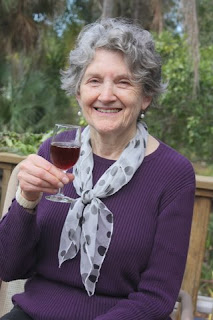Today's post comes to us from Lucille Bell, Peter's 81-year-old mother.
"You're the expert, Lucille. "You choose the wine.'
We are sitting around a table in a French restaurant in Toronto, celebrating a birthday. Five old ladies, chums since dead husbands made them girls again, gossipy and giggly and happy to be out for an evening on the town.
"But I can't choose the wine until I know what we're going to eat,' I say.
"Well, I'll have the salmon," says one. "We're all supposed to have fish once a week.'
"It's beef for me," says another. "I never cook it at home."
The beef tempts me too. My other two friends are vegetarian and opt for meatless lasagna. I take the easy way out and order a bottle of Chardonnay, knowing all along that no matter what people are eating, white is the safest choice, as long as it's 'dry.'
What I really know about wine, from being the mother of a winemaker, is very spotty and thin, amounting to not very much at all. I was brought up in a teetotalling household, where drinking was considered a sin. The 'wine' drunk during communion at church was always plain grape juice. And plain grape juice, incidentally, was what we drank at home when we were sick. Perhaps the groundwork for the future grape connection began then.
I began to drink at university when sherry was often served at faculty-student get togethers. I quite liked it, and no stain of sin emerged. At home, of course, I kept the bad news to myself.
Later on I recall becoming interested in the mysteries of single malt Scotch whiskey. The much vaster universe of wine had not yet been revealed. And it was not until Peter had sailed away to Australia to learn about that universe that I made a point of learning some wine lingo.
Public television conveniently aired a series of lectures featuring Jancis Robinson touring vineyards in Europe. I wanted to be a little bit like her, with her charming confidence and huge erudition. I bought her big book, and figured out a few things about the process of making wine.
I also listened carefully when Peter talked about palates and aromas and aftertastes and likened the flavors of wines to foods and other objects, like leather. I learned that balance was important, and that aggressive tannins were good in some wines and not in others.
I was an expert! So I began to show off. Out with friends I tried to swirl my glass and then imbibe the fumes in a knowing way. No one noticed, unless I poured some of the wine down my front, which I often did.
"Lovely aftertaste," I often remarked to indifferent guests. And one time at a small dinner party I even instructed my guests to hold their glasses properly, swirl the wine and then sniff.
Gradually I became less bossy, and listened to the comments about my talents with reservation. What I had acquired after all was simply an interest in something of eminent importance to my son, and hence to me. My interest stemmed from the heart and not the mind. What did it matter what wines my friends and I drank when no one noticed or cared? We had a lovely time together even if that dry white wine was always the same.
Of course to myself, secretly and in the dark, I like to think that I am a little bit of an expert, knowing that I am always just a question away from vast resources that I can tap whenever I want.
Now I like to gloat about how lucky I am to have a son who makes his mother feel so smart.

No comments:
Post a Comment